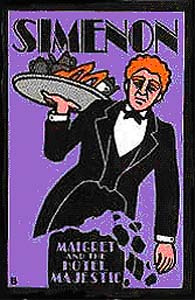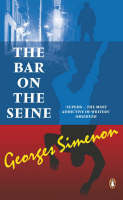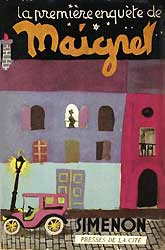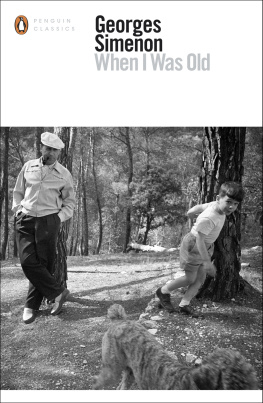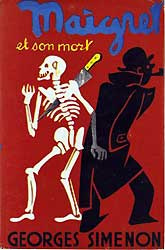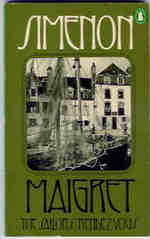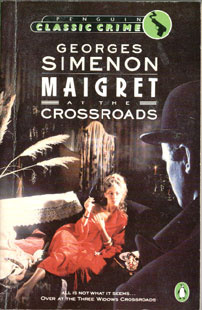Georges Simenon - Maigrets War of Nerves
Here you can read online Georges Simenon - Maigrets War of Nerves full text of the book (entire story) in english for free. Download pdf and epub, get meaning, cover and reviews about this ebook. year: 1986, publisher: Harcourt, genre: Detective and thriller. Description of the work, (preface) as well as reviews are available. Best literature library LitArk.com created for fans of good reading and offers a wide selection of genres:
Romance novel
Science fiction
Adventure
Detective
Science
History
Home and family
Prose
Art
Politics
Computer
Non-fiction
Religion
Business
Children
Humor
Choose a favorite category and find really read worthwhile books. Enjoy immersion in the world of imagination, feel the emotions of the characters or learn something new for yourself, make an fascinating discovery.
- Book:Maigrets War of Nerves
- Author:
- Publisher:Harcourt
- Genre:
- Year:1986
- Rating:4 / 5
- Favourites:Add to favourites
- Your mark:
- 80
- 1
- 2
- 3
- 4
- 5
Maigrets War of Nerves: summary, description and annotation
We offer to read an annotation, description, summary or preface (depends on what the author of the book "Maigrets War of Nerves" wrote himself). If you haven't found the necessary information about the book — write in the comments, we will try to find it.
Maigrets War of Nerves — read online for free the complete book (whole text) full work
Below is the text of the book, divided by pages. System saving the place of the last page read, allows you to conveniently read the book "Maigrets War of Nerves" online for free, without having to search again every time where you left off. Put a bookmark, and you can go to the page where you finished reading at any time.
Font size:
Interval:
Bookmark:
Maigret's War Of Nerves
La tte d'un homme [L'homme de la Tour Eiffel]
the 5th episode in the Maigret Saga
1930
Georges Simenon
translated by Geoffrey Sainsbury
3S XHTML edition 1.0
Contents
A HELEN AND KURT WOLFF BOOK
HARCOURT BRACE JOVANOVICH, PUBLISHERS
SAN DIEGO NEW YORK LONDON
Copyright 1940 by Georges Simenon
All rights reserved. No part of this publication may be reproduced or transmitted in any form or by any means, electronic or mechanical, including photocopy, recording, or any information storage and retrieval system, without permission in writing from the publisher.
Requests for permission to make copies of any part of the work should be mailed to:
Permissions, Harcourt Brace Jovanovich, Publishers, Orlando, Florida32887
LIBRARY OF CONGRESS CATALOGING IN PUBLICATION DATA
Simenon, Georges, 1903
Maigrets war of nerves.
Translation of: La tte dun homme.
A Helen and Kurt Wolff book.
I. Title.
PQZ637.I53T413 1986 843'.9H 85-14749
ISBN 0-15-155570-2
Designed by Francesca M. Smith Printed in the United States of America Second American edition
Maigrets War of Nerves
1
Cell Number 11
Somewhere in Sant Prison a clock struck two. The condemned man was sitting on his bed. His large knotty hands gripped his knees.
For a minute, perhaps, he sat there quite still, tense, listening. Then with a sigh he stretched his limbs and stood up in the cell, huge, awkward, head too large, arms too long, chest hollow. His face expressed nothing except a dull, blank stupidity, or perhaps inhuman callousness. Nevertheless, before reaching the door he shook his fist at one of the walls.
On the other side of this wall was a cell just like his, one of a row of cells in that section of Sant known as the Grande Surveillance, maximum security.
In this cell, as in four of the others, a condemned man was waiting. Waiting either for reprieve or for that solemn group who would come one night and wake him without so much as a word.
And for the last five days, every hour and every minute, this prisoner had groaned. Sometimes it was a dull monotonous whine, sometimes cries, tears, or shouts of fury. Number 11 had never seen him, nor did he know anything about him. All he could guess from his voice was that he was quite young.
Just now the groans were tired, almost mechanical in their persistence. And a spark of hatred flashed into Number 11s eyes as he clenched that knotty fist.
From all around, from the corridors and yards of the fortress of Sant Prison, from the streets that skirted it, from the more distant quarters of Paris, there came no sound.
Nothing but the groaning of Number 13.
Number 11 tugged at one of his fingers spasmodically, shivered, shivered again, then reached for the handle of the door.
The cell was lighted, according to the regulations for the Grande Surveillance. Normally, a guard would be in the corridor looking hour by hour into the five cells of the condemned men. A spasm of anxiety shook Number 11 as he tried the handle. It was a fateful moment.
The door opened. The guards chair was there, empty.
The man started walking quickly, dizzily, bending low. His face was dead white. Yet the eyelids of his greenish eyes were reddened.
Three times he turned around, because he had lost his way and come to locked doors. At the end of a corridor he heard voices. A group of guards were talking and smoking.
At last he went out into a courtyard, the darkness of which was pierced here and there by a circle of light from one of the lamps. A hundred yards away, a man on guard duty was walking up and down by a gate. In another direction, a window was lighted up, and a man could be seen smoking a pipe, bent over a desk littered with papers.
Number 11 would have liked to consult the note he had found three days before, tucked in with his food, but he had swallowed it, as the writer had told him to. An hour ago he had known it by heart, but now parts of it were slipping from his memory.
On October 15th at two in the morning you will find the door of your cell unlocked and the guard busy elsewhere. If you follow these instructions
He ran a burning hand across his brow, shot a terrified glance from one lamp to the next, and nearly cried out when he heard steps. But they were on the other side of the prison wall. Free people talking to one another, while their footsteps rang out on the sidewalk.
When I think of their having the nerve to charge fifty francs for a seat
It was a womans voice.
Oh, you know, they have a lot of expenses, answered a man.
The prisoner felt along the wall, stopped when he kicked a stone, and listened, so white, so unnatural with his absurdly long arms groping in the empty air, that in any other place you would have taken him for a drunk.
They were hardly fifty paces from the invisible prisoner, a little group gathered in a recess by a door leading to some offices.
Inspector Maigret leaned against the dark brick wall. His hands stuffed in his overcoat pockets, he stood so stonily on his strong legs and kept so still that he seemed a lifeless mass. But at regular intervals came the wheezing of his pipe, and somehow you could guess the anxiety that he could not keep out of his eyes.
Ten times at least he had to nudge the examining magistrate, Monsieur Comliau, to stop his fidgeting. The latter had arrived at one oclock, from some reception or other. He was in evening dress, his thin mustache carefully brushed up, his complexion redder than usual.
Besides these two was a third person, Monsieur Grassier, the governor of Sant. With a sulky expression on his face, his coat collar turned up, he pretended to take no interest in what was going on.
It was more than chilly, and the man on guard duty stamped to warm his feet. At each breath a fine cloud was blown into the air.
They could not see Number 11, who avoided the circles of light. But, in spite of his care to make no noise, they could hear him moving and could more or less make out what he was doing.
After ten minutes, the examining magistrate leaned over to Maigret and opened his mouth to speak. But the inspector gripped his shoulder with such force that he held his tongue, sighed, and mechanically took out a cigarette, which was promptly whisked out of his hand.
All three had understood. Number 11 had lost his bearings, and at any minute might be discovered by someone making the rounds.
And they could do nothing about it. They couldnt very well take him by the hand and lead him to the knotted rope that hung down the wall, beneath which was the bundle of clothes.
Sometimes a car passed along the street. Sometimes voices came over, echoing strangely in the prison yard.
The three men could only exchange glances. Those of the governor were angry, sarcastic, savage. As for Com-liau, his nervousness was increasing every minute. Maigret was the only one to keep his composure and his confidence, but it was only by an effort of will. In daylight you would have noticed that his forehead was glistening with sweat.
When the half hour struck, the man was still wandering around. And then suddenly they were conscious of his feverish haste as he stumbled on the bundle of clothes and felt for the rope.
The guards steps still tapped out the passage of time. The examining magistrate could not help risking a whisper:
Youre quite sure
But Maigret shut him up with a look. There was the faintest sound as the rope stretched, and they could just make out a pale splotch against the wallthe face of Number 11 as he hauled himself up hand over hand.
Next pageFont size:
Interval:
Bookmark:
Similar books «Maigrets War of Nerves»
Look at similar books to Maigrets War of Nerves. We have selected literature similar in name and meaning in the hope of providing readers with more options to find new, interesting, not yet read works.
Discussion, reviews of the book Maigrets War of Nerves and just readers' own opinions. Leave your comments, write what you think about the work, its meaning or the main characters. Specify what exactly you liked and what you didn't like, and why you think so.



